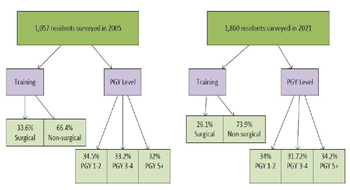Changes in attitudes, beliefs, and experiences related to pregnancy during graduate medical education training from 2005 to 2021
DOI:
https://doi.org/10.17305/bb.2023.9865Keywords:
Maternity leave, parental leave, pregnancy, residency, trainingAbstract
Today, 50% of medical students are women, and residency and fellowship training years overlap with peak times for starting families. The authors describe attitudes toward pregnancy during residency and fellowship and report pregnancy rates and complications for female residents and resident partners across several decades. A web-based survey was emailed to 1,057 residents in 2005 (period 1) and 1,860 residents in 2021 (period 2). Anonymous surveys were sent to all trainees including pregnant trainees, affected co-trainees and trainee partners. Resident attitudes and pregnancy characteristics were compared between groups using the chi-square (χ2) test for categorical variables and the Kruskal-Wallis test for ordinal variables. A total of 442 residents (41.8%) responded to the 2005 survey, and 525 (28.2%) responded to the 2021 survey. Most residents who covered for a pregnant resident had positive feelings about covering for their colleagues during both time periods, although more positive attitudes were present during the period 2. Only about 10% of residents received compensation for their coverage during both time periods. Among residents with a pregnancy during training (i.e., themselves or partners), most characterized having a baby in training as “somewhat difficult” or “very difficult” at both time periods. Pregnancy complication rates were 33% and 44% for training years 2005 and 2021. As medical education evolves, training programs should be proactive in creating structured support systems for pregnant residents and resident partners to minimize adverse maternal and fetal outcomes and to improve training programs. Future studies are needed to elucidate the causality of higher-than-expected pregnancy complication rates.
Citations
Downloads

Downloads
Published
Issue
Section
Categories
License
Copyright (c) 2023 Lindsay Warner, Lindsay Hunter Guevara, Andrea Watson, Sara Farmer, Ramila Mehta, Jason Homme

This work is licensed under a Creative Commons Attribution 4.0 International License.
How to Cite
Accepted 2023-11-20
Published 2024-05-02









